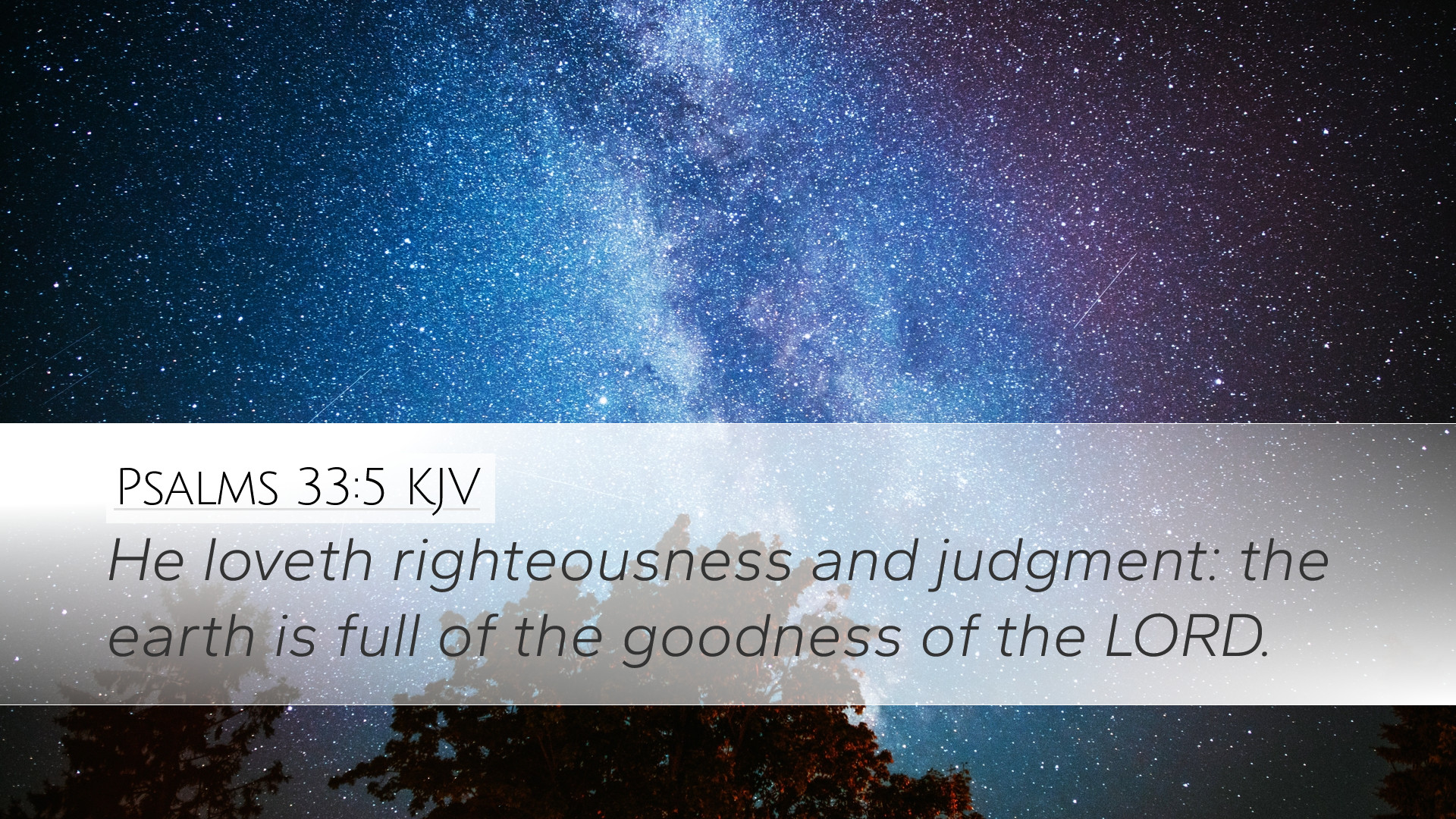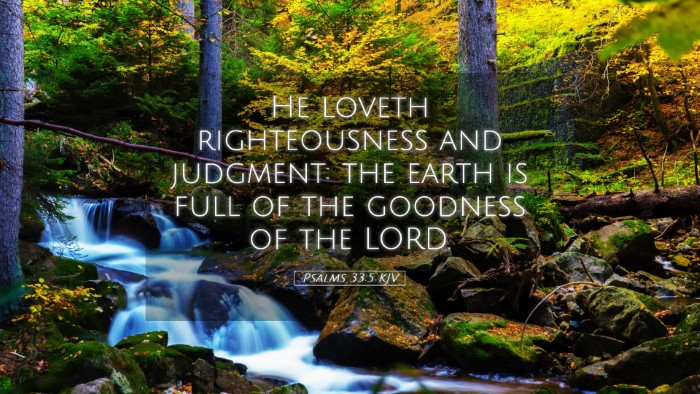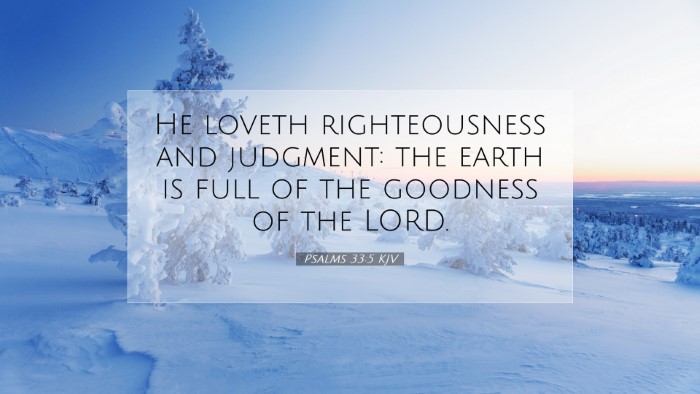Psalms 33:5 - Commentary and Insights
Bible Verse: “He loves righteousness and justice; the earth is full of the steadfast love of the Lord.”
Introduction
The verse from Psalm 33:5 encapsulates a profound truth concerning the nature of God and His governing principles over creation. By juxtaposing righteousness, justice, and the steadfast love of the Lord, the psalmist effectively highlights a divine order that permeates the universe. This commentary will draw insights from noted public domain commentaries, elucidating the theological and practical implications of this verse.
The Nature of God’s Love
The phrase “the earth is full of the steadfast love of the Lord” serves as a declaration of God’s pervasive love. According to Matthew Henry, this love is not merely a feeling but is rooted in the moral attributes of God. He states that God’s love actively supports and sustains creation, thereby ensuring that His justice and righteousness are manifest in the world.
Adam Clarke expands on this by suggesting that God's love is steadfast—it does not wane or falter. This steadfastness is integral to understanding God's dealings with humanity and reflects His faithfulness to His covenant. It reassures believers that God’s love will always prevail over chaos and corruption.
The Relationship between Righteousness and Justice
Righteousness and justice are central to the character of God. Albert Barnes notes that righteousness signifies God’s moral perfection, while justice indicates the enforcement of that righteousness. Together, they represent the foundation upon which divine governance operates. The psalmist’s assertion that God loves these qualities implies that they are not only admired by Him but are also essential in His interactions with humanity.
Moreover, the combination of righteousness and justice provides a framework for understanding divine intervention. Through His love, God seeks to restore righteousness in a world that is often skewed towards injustice. This theological perspective encourages pastors and theologians to preach a message of hope that underscores God’s desire for societal justice and equitable treatment for all.
Implications for Believers
For believers, this verse carries significant implications regarding their conduct and aspirations. Henry comments that one of the requirements for those who claim to love God is to emulate His attributes of righteousness and justice. Hence, it invites profound introspection on the part of believers concerning their actions and motivations.
- Living Righteously: Believers are called to reflect God’s righteousness in their lives by adhering to His moral standards, thus glorifying Him through their actions.
- Pursuing Justice: This verse challenges Christians to become advocates for justice in society, confronting social injustices and inequities.
- Experiencing God’s Love: Understanding that the earth is filled with God's love encourages believers to trust in God's providence and to experience His love in their daily lives.
The Universality of God’s Love
Moreover, the universality of God’s love is a central theme that emerges from this text. Clarke emphasizes that the evidence of God's love permeates every corner of creation. Whether through nature’s beauty or the blessings of life, believers can see God's love manifested everywhere. This realization should lead to a response of worship and gratitude.
Barnes further explains that this love transcends understanding, suggesting that despite humanity’s waywardness, God continues to extend His love, thereby extending an invitation for salvation and reconciliation. This highlights the redemptive nature of God’s love in the context of the believer’s relationship with Christ.
God’s Sovereignty in Creation
The acknowledgement of God’s love involves recognizing His sovereignty over all creation. Psalm 33:5 asserts that the earth is full of this love, which requires engagement with the concept of God as the supreme ruler. Matthew Henry emphasizes that the governance of God is not arbitrary but is rooted in His perfect righteous character.
This has profound implications for understanding providence. When believers recognize God’s hand in the world, they can trust in His plans during turbulent times. They can navigate the complexities of life with the assurance that God's righteous judgments are working even when circumstances seem unjust.
Exhortation for Worship
The psalm concludes with an exhortation to worship, grounded in the reality conveyed in this verse. Acknowledging that God loves righteousness and justice leads directly to a posture of reverence and awe. Clarke states that understanding God’s nature compels believers to worship Him not only for what He does but for who He is.
- Worship through Service: As a response to God’s attributes, believers are encouraged to engage in acts of service that reflect His righteousness.
- Collective Worship: The communal aspect of worship also gains prominence, highlighting the need for believers to come together to honor God publicly.
- Life as Worship: Finally, this verse encourages believers to view their entire lives as an act of worship, aligning daily actions with God’s standards of righteousness.
Conclusion
Psalms 33:5 serves as a poignant reminder of the character of God and His expectations for His people. By deeply engaging with this scripture, pastors, students, theologians, and scholars can draw profound insights that enhance their understanding of God’s nature, encourage righteous living, and inspire a life committed to justice:
Ultimately, this commentary invites readers to experience and reflect God’s steadfast love in a world in desperate need of righteousness and justice.


